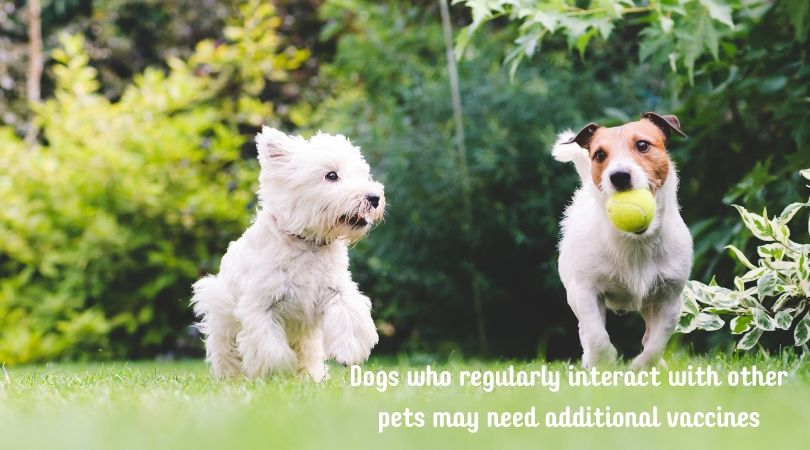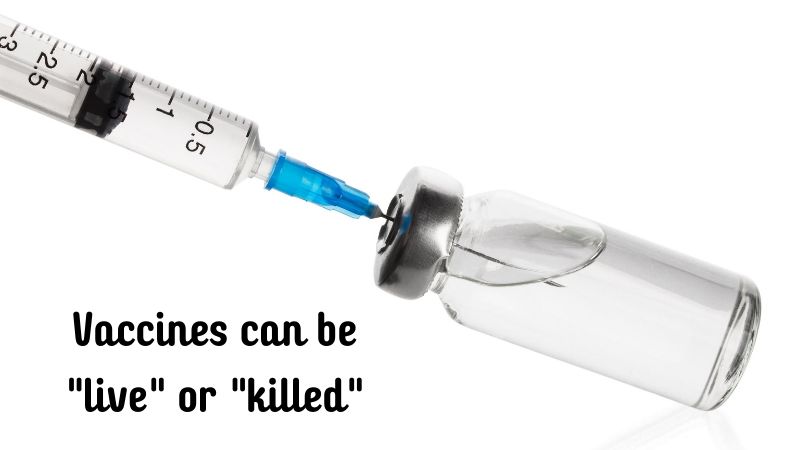Effective vaccines can give you peace of mind when it comes to the good health of your pets. And in fact, many states and municipalities require proof of immunization for dogs and cats. Can you imagine encountering a rabid dog on your daily walk with Fido?
Fortunately, adhering to recommended vaccine protocols means we have the luxury of not worrying quite so much about such things.
However, you may wonder how veterinary vaccines work. What’s the difference between live and killed immunizations? What do IM vs SQ injections mean? In this article, we’ll aim to answer these questions and more.
Vaccine Basics
But first, let’s look at a brief overview of vaccine basics. This explanation is from NOAH, a UK animal rights organization:
“Vaccines work by stimulating an immune response in an animal without causing the disease itself. When healthy animals are vaccinated, their own immune system responds to the vaccine and can remember the infectious agent to which the animal is vaccinated. This means, if appropriately vaccinated animals are then exposed to the pathogen against which they have been vaccinated, they can expect a level of protection from disease.”
Some vaccines - like rabies - are government mandated for public safety. There is also a standard vaccination schedule for puppies and kittens at 6, 12, and 16 weeks of age which include immunizations against distemper, parvo, hepatitis, and other dangerous diseases.
These are the “core” vaccines that veterinarians recommend for nearly all pets. Then, your dog or cat will need boosters periodically throughout their lives.

Beyond the core vaccines, your veterinarian will recommend other vaccines based on your pet’s age, health, and lifestyle. For example, dogs who go to doggie daycare or regularly interact with other animals will need to be up-to-date on their kennel cough and canine influenza vaccines
Each pet will have an individualized veterinarian protocol.
Now, let’s look at some of the vaccine terms you’ll hear, like IM vs. SQ and killed vs. live vaccines. What do they mean?
What Are IM vs. SQ Injections?
You’ve probably never thought about where the vaccines are given, yet it turns out, there are different places where they can be injected.
For example, “IM injection” means an intramuscular injection. This injection goes into the muscle. The muscles have good blood flow, so when the injection is properly executed, they’ll absorb the medication quickly. (Source)
Subcutaneous injections (SQ) go under the skin but not directly into the muscle. The vaccine is usually absorbed slower than an IM injection. Many live vaccines are administered this way.
What’s the Difference Between Live and Killed Vaccines?
If you do much reading about vaccines, you’ll find there are different types. Two of those are “live” and “killed” vaccines.

“Live” vaccines are also called “attenuated.” These vaccines have a weakened version of the disease, known as a pathogen. When your pet receives this type of vaccine, the pathogen causes your pet’s body to stimulate a response but does not cause the disease.
Inactive or killed vaccines also contain the pathogen, but rather than simply a weaker version, they no longer have any ability to infect your pet. Both improve the immune response and protect against a specific disease. According to the American Animal Hospital Association, “The immunizing virus/bacteria in a ‘noninfectious’ vaccine is not capable of replicating within the host after administration. All inactivated (killed) viral vaccines (e.g., rabies, CIV) and bacterial vaccines are noninfectious (e.g., leptospirosis, Borrelia burgdorferi [canine Lyme disease], canine influenza virus, and parenteral B. bronchiseptica vaccines)."
It’s commonly believed that “live” immunizations are long-lasting - your pet may need fewer doses for a lifetime of protection. However, “killed” vaccines are considered more stable when it comes to storage. Your veterinarian can go deeper into both the availability and advantages of vaccination for your particular pet.
The Importance of Vaccines to Your Dog or Cat’s Health
Vaccines are important for your pet’s health. When puppies and kittens are first born, they have limited protection against diseases like parvo and rabies. That protection weakens and disappears within the first few weeks of their lives.
That’s why veterinarians have a standard approach to “puppy shots” and “kitten shots” when pets are young. As they get older, they’ll require “booster” shots at regular intervals which your veterinarian will discuss with you.
In addition to protecting your pet’s health, most local ordinances require proof of immunization against diseases like rabies. Besides keeping your pet healthy, immunizations are also cheaper than treatment. Is your pet due for a checkup? Reach out to us!



